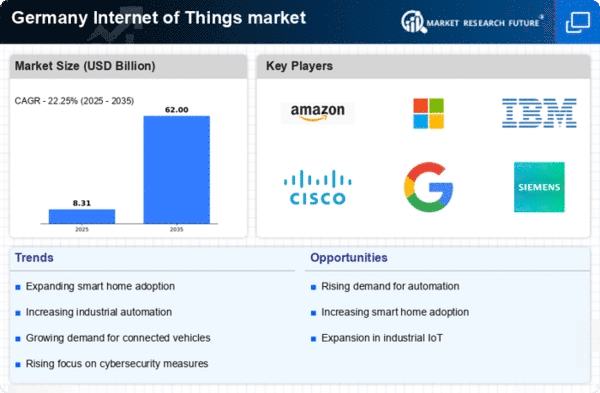Rising Demand for Automation
The Internet of Things market in Germany experiences a notable surge in demand for automation across various sectors. Industries are increasingly adopting IoT solutions to enhance operational efficiency and reduce costs. For instance, the manufacturing sector is projected to invest approximately €10 billion in IoT technologies by 2026, driven by the need for smart factories and automated processes. This trend indicates a shift towards interconnected systems that facilitate real-time data exchange, ultimately leading to improved productivity. Furthermore, the integration of IoT devices allows for predictive maintenance, which can reduce downtime by up to 30%. As businesses recognize the potential of automation, the internet of-things market is likely to expand significantly, fostering innovation and competitiveness in the German economy.
Increased Focus on Data Security
As the Internet of Things market expands in Germany, the emphasis on data security becomes paramount. With the proliferation of connected devices, concerns regarding data privacy and cybersecurity are rising. The German government has introduced stringent regulations to protect consumer data, which is likely to influence the adoption of IoT technologies. Companies are investing in advanced security measures, such as encryption and secure communication protocols, to safeguard sensitive information. This focus on data security is expected to drive innovation within the internet of-things market, as businesses seek to build trust with consumers. Moreover, the market for IoT security solutions is projected to grow by 25% annually, reflecting the increasing importance of secure IoT ecosystems.
Expansion of Smart Cities Initiatives
Germany's commitment to developing smart cities plays a crucial role in the growth of the Internet of Things market. Urban areas are increasingly implementing IoT solutions to enhance public services, improve infrastructure, and promote sustainability. For example, cities like Berlin and Munich are investing in smart traffic management systems that utilize IoT sensors to optimize traffic flow and reduce congestion. This initiative not only improves the quality of life for residents but also contributes to environmental goals by decreasing emissions. The German government has allocated over €1 billion for smart city projects, indicating a strong focus on integrating technology into urban planning. As these initiatives progress, the internet of-things market is expected to thrive, providing innovative solutions that address urban challenges.
Healthcare Transformation through IoT
The healthcare sector in Germany is undergoing a transformation, significantly impacting the Internet of Things market. The adoption of IoT devices in healthcare facilitates remote patient monitoring, telemedicine, and personalized treatment plans. With an estimated market value of €5 billion by 2025, the integration of IoT in healthcare is poised to enhance patient outcomes and streamline operations. Hospitals are increasingly utilizing connected devices to monitor vital signs and manage chronic diseases, which can lead to a reduction in hospital readmissions by up to 20%. This shift towards digital health solutions not only improves patient care but also reduces healthcare costs, thereby driving the growth of the internet of-things market in Germany.
Advancements in Connectivity Technologies
The evolution of connectivity technologies significantly impacts the Internet of Things market in Germany. The rollout of 5G networks is set to revolutionize IoT applications by providing faster data transmission and lower latency. This advancement enables real-time communication between devices, which is essential for applications such as autonomous vehicles and smart grids. The German government has invested heavily in 5G infrastructure, with plans to cover 98% of the population by 2025. This investment is likely to enhance the capabilities of IoT devices, fostering innovation and expanding market opportunities. As connectivity improves, the internet of-things market is expected to witness accelerated growth, driven by the demand for seamless and efficient communication.
















